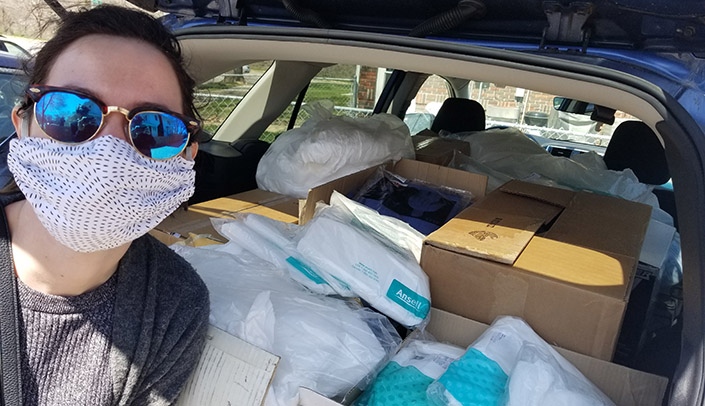When Sean Figy, MD, and Regan Taylor, MD, were creating the online “Impact of Infectious Diseases” (IID) course this spring in reaction to medical and physician assistant students being unable to begin their clinical rotations, the idea of a community engagement component was integral.
“We knew that taking the students out of the clinical space was going to make them feel as though they weren’t contributing,” Dr. Figy said.
“That was one of the primary concerns when they got pulled out (of rotations),” Dr. Taylor said. “So many wanted to be actively involved in some way in helping during the pandemic.”
So as part of the course, the two faculty members created a community service requirement and posted a few local volunteer opportunities.
The result? “What they did went far beyond anything we gave them,” Dr. Taylor said.
“The charge was to ‘Use your skills to benefit the community around you,’ and they took it and ran with it,” Dr. Figy said. “We cannot claim credit for the impact they had.”
That impact, to start, included more than 8,000 volunteer hours over the course of eight weeks from 320 students. But in addition, UNMC medical and physician assistant students didn’t simply volunteer at existing community organizations — they looked around, identified needs and created new organizations to fill them.
The UNMC COVID Relief (UNMC CoRe) Program spearheaded a number of initiatives, including volunteering to help frontline providers with child and pet care, a mask-sewing project, and a personal protective equiment (PPE) initiative that to date has provided 44,500 items of PPE to clinics in Omaha and across Nebraska. Other programs delivered food and information to refugee communities, provided live music to care facilities; began corresponding with home or facility-bound seniors, and began a targeted food bank aimed at an underserved community.
“This is experiential learning in its truest form,” said med student Taylor Kratochvil, one of the founders of UNMC CoRe. “We are all hungry in our early years of education for opportunities to get out of the classroom and be able to interact with those we want to serve. This was an impromptu way to do just that.
“Being able to have those personal interactions with our community, the folks you want to serve, is just incredibly invaluable.”
“The biggest thing I got out of being a member of UNMC CoRe was seeing the leadership qualities that these different students bring and what they excel at,” said Keely Reidelberger, a med student who helped lead UNMC CoRe’s PPE drive. “All of the students were just phenomenal. And I’ve learned how to navigate organizations and make a difference with public health in my own community.”
Seif Nasir, a med student who created the MUNA Box Program, which provided food, necessities and COVID-19 information to refugees, admitted he was disappointed to be furloughed from his medical studies.
“But the outreach portion of the IID course allowed us to give back to our communities in a tangible way,” he said. “That’s something that’s often overlooked or sacrificed when we are submerged in textbook and clinical learning. It gave students an outlet to explore the breadth of public health and a way to get hands-on experience with community development projects. Personally, it allowed me to be productive in a meaningful and rewarding way, and to remind myself about the importance of community health and outreach in the well-being of our communities.”
People who get into medical school or physician assistant programs are no strangers to community service and volunteerism, Dr. Figy said.
“All of these people have done great things in their communities before,” he said.
So, it was no surprise how successful the UNMC students were, Dr. Taylor said.
“I knew they would do a good job,” she said. “But that doesn’t stop me from being overwhelmed by how much they put into it and how far they went.”

THANK YOU to the physician assistant students too!